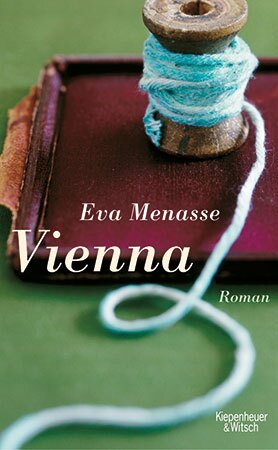Eva Menasse
Vienna
[Vienna]
- Kiepenheuer & Witsch Verlag
- Cologne 2005
- ISBN 3-462-03465-0
- 432 Pages
- Publisher’s contact details
Eva Menasse
Vienna
[Vienna]
Published in Chinese with a grant from Litrix.de.
Sample translations
Review
The novel Vienna was one of the most successful and much-discussed debuts of early 2005, a colorful kaleidoscope of family stories, family history and the history of our times penned by the young journalist Eva Menasse, herself born in Vienna in 1970. In a multitude of episodes and incidents major and minor, an unnamed narrator unfolds the story of a Jewish family from the 1930s to the present. This autobiographically-tinged family portrait derives its abundant charm from the way Menasse draws on the tradition of Jewish literary humor, which lives from jokes and witty anecdotes.
The family itself is just as colorful and diverse as the episodes the narrator presents from its poignant and turbulent history: the grandfather was a Viennese Jew, a gambler and liquor salesman, while the grandmother was a Sudeten German Catholic, such a passionate bridge player that she nearly gave birth to her youngest son at the card table in a coffeehouse. That son, the narrator’s father, achieved a certain fame in 1950s Vienna as a successful and charming soccer-player. Her older brother is the family’s first intellectual, a pugnacious historian whose opinions spark controversy in the “Alpine republic” and beyond.
Despite, or because of, these radically different character traits, the family is in many ways a typical one – and it quickly seems familiar to non-Jewish readers too. At times one feels that one has stumbled into a big family reunion, only too glad to meet sanctimonious Aunt Gustl, her simple-minded husband Königsbee and their son, the incorrigibly criminal Nandl – for starters.
With a light and laconic touch they are all presented as parts of a loquacious extended family chiefly held together by one common passion: “EM-EM”, or “manic mythologizing”. This is the practice of telling and retelling, the increasingly sophisticated evocation of the same canonized tales from the familiar stock of myths. In a novel which itself is brilliantly told, Menasse vividly shows how storytelling serves to create identity and how it can be very consciously set up for the purpose. The motto of these connoisseurs of life and its stories could be: I tell stories, therefore I am – as part of a certain tradition and community.
By setting down the uninterrupted torrent of stories, Vienna commemorates a family tradition that is threatened by the passing of the older generation. It is a kind of “eulogy” (as the last chapter is called), one last attempt to conjure up what has been lost, to capture the diversity of voices and preserve a threatened identity through the act of memory. At the same time, however, one senses how difficult it must have been for the narrator to develop a voice of her own in this voluble family, to make herself heard. We learn least of all about the person who is telling us all these things. She remains the secret, strangely empty center around which all the characters are grouped – a conductor of the voices in the family choir rather than a virtuoso soloist.
It is all the more astonishing that she manages all the narrative strands with such supreme confidence, weaving anecdote after anecdote into a vivid, eventful and whimsical portrait of a European century. The novel’s title refers to the Viennese football club (for which the father played), but also, of course, to the city of Vienna. Yet the scope of the world described here encompasses far more than the Austrian capital; it extends from England to Burma and Canada, from the beginning of the 20th century to the 1980s.
With plenty of humor and just the right amount of detachment, Menasse draws on an overwhelming wealth of anecdotes to piece together a mosaic-like panorama, fast-paced, filled with witty twists and blithely shifting between times and places. However light the mood, the darkness of National Socialism is repeatedly evoked. The casualness of these passages in no way lessens the horror in the stories of air raids and children sent abroad to safety; in fact, the contrast makes it even more tangible.
With Vienna, Eva Menasse has pulled off a brilliant fiction debut. Her characters are drawn with a sure and loving hand; one could linger indefinitely, listening to their entertaining anecdotes and often startlingly perspicacious digressions.

The family itself is just as colorful and diverse as the episodes the narrator presents from its poignant and turbulent history: the grandfather was a Viennese Jew, a gambler and liquor salesman, while the grandmother was a Sudeten German Catholic, such a passionate bridge player that she nearly gave birth to her youngest son at the card table in a coffeehouse. That son, the narrator’s father, achieved a certain fame in 1950s Vienna as a successful and charming soccer-player. Her older brother is the family’s first intellectual, a pugnacious historian whose opinions spark controversy in the “Alpine republic” and beyond.
Despite, or because of, these radically different character traits, the family is in many ways a typical one – and it quickly seems familiar to non-Jewish readers too. At times one feels that one has stumbled into a big family reunion, only too glad to meet sanctimonious Aunt Gustl, her simple-minded husband Königsbee and their son, the incorrigibly criminal Nandl – for starters.
With a light and laconic touch they are all presented as parts of a loquacious extended family chiefly held together by one common passion: “EM-EM”, or “manic mythologizing”. This is the practice of telling and retelling, the increasingly sophisticated evocation of the same canonized tales from the familiar stock of myths. In a novel which itself is brilliantly told, Menasse vividly shows how storytelling serves to create identity and how it can be very consciously set up for the purpose. The motto of these connoisseurs of life and its stories could be: I tell stories, therefore I am – as part of a certain tradition and community.
By setting down the uninterrupted torrent of stories, Vienna commemorates a family tradition that is threatened by the passing of the older generation. It is a kind of “eulogy” (as the last chapter is called), one last attempt to conjure up what has been lost, to capture the diversity of voices and preserve a threatened identity through the act of memory. At the same time, however, one senses how difficult it must have been for the narrator to develop a voice of her own in this voluble family, to make herself heard. We learn least of all about the person who is telling us all these things. She remains the secret, strangely empty center around which all the characters are grouped – a conductor of the voices in the family choir rather than a virtuoso soloist.
It is all the more astonishing that she manages all the narrative strands with such supreme confidence, weaving anecdote after anecdote into a vivid, eventful and whimsical portrait of a European century. The novel’s title refers to the Viennese football club (for which the father played), but also, of course, to the city of Vienna. Yet the scope of the world described here encompasses far more than the Austrian capital; it extends from England to Burma and Canada, from the beginning of the 20th century to the 1980s.
With plenty of humor and just the right amount of detachment, Menasse draws on an overwhelming wealth of anecdotes to piece together a mosaic-like panorama, fast-paced, filled with witty twists and blithely shifting between times and places. However light the mood, the darkness of National Socialism is repeatedly evoked. The casualness of these passages in no way lessens the horror in the stories of air raids and children sent abroad to safety; in fact, the contrast makes it even more tangible.
With Vienna, Eva Menasse has pulled off a brilliant fiction debut. Her characters are drawn with a sure and loving hand; one could linger indefinitely, listening to their entertaining anecdotes and often startlingly perspicacious digressions.
Translated by Isabel Fargo Cole

By Anne-Bitt Gerecke
